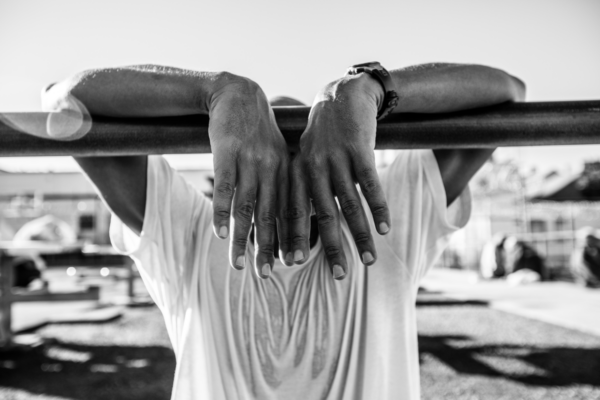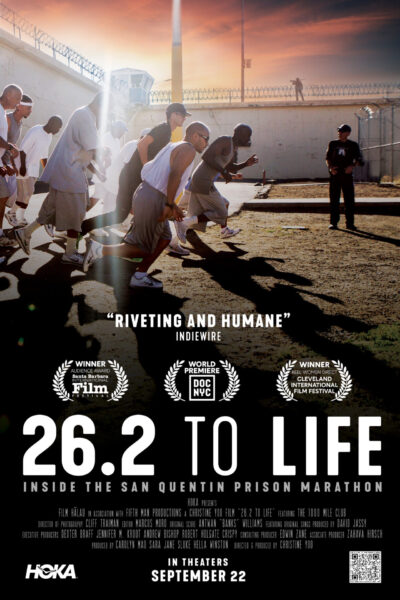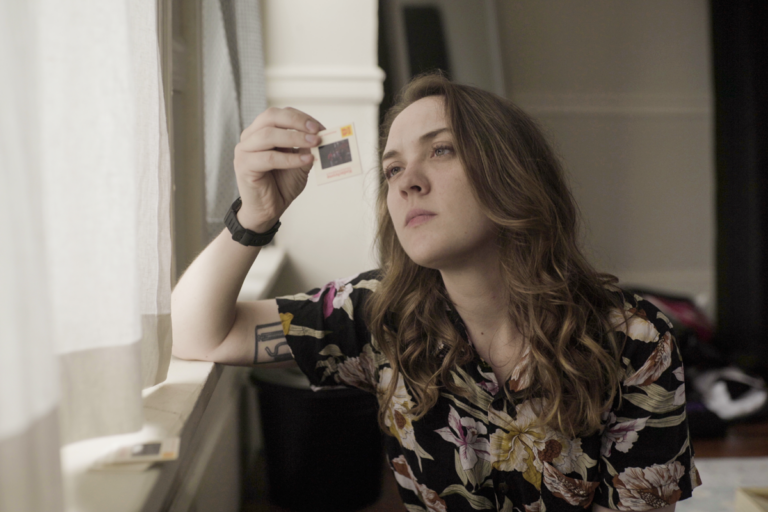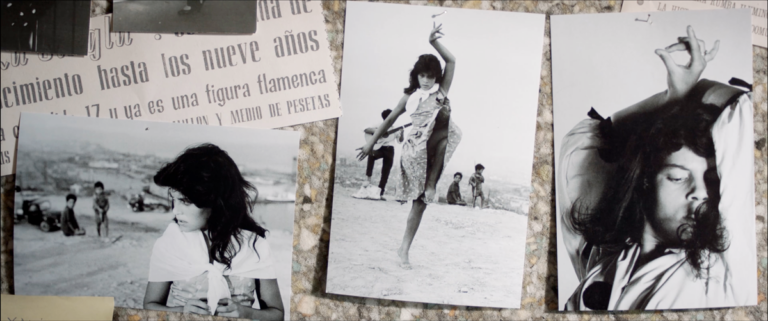26.2 TO LIFE takes us inside California’s oldest prison, where members of the 1000 Mile Club–San Quentin’s volunteer-led running group–are about to run the prison’s annual marathon: 105 laps on a quarter-mile, uneven dirt and concrete path that loops the prison’s busy lower yard. Shot over the course of three years and with unprecedented access to the prison, this character driven film unfolds via cinema verite, giving us an intimate look at these men’s lives. The film follows them on and off the makeshift track, as they confront the challenges of aging, maintaining family relationships, getting an education and engaging in meaningful work from behind bars, all while knowing that they may never again see life on the outside.
The film opens in the quiet pre-dawn light, marathon day. Frank Ruona, (age 71) head volunteer coach since the club’s 2005 inception, passes through layers of security and clanging medieval iron into this hidden world.
Frank’s volunteerism is rooted in his religious beliefs that guide him simply to be there for his fellow man; he is his brother’s keeper. A Vietnam vet, Frank is USA Track & Field certified and has completed 78 marathons and 38 ultra-marathons, including a 100 mile race, and was ranked the #1 road runner in the country when he was 55. But it’s not Frank’s running pedigree that’s won over the guys in the club, it’s his consistency. Frank shows up — week after week, year after year, marking time, counting mileage and recording the achievements of a group of men who are eager to strive for more.
Less than 1% of the population, free or incarcerated, ever completes a marathon. For these men, finishing the race is not just entree into a club of the world’s most elite athletes, it’s a chance to be defined by more than their crime and gain the kind of self-confidence that leads to healing family relationships, continuing education and finding purpose. In an environment where movement is tightly controlled, running is as much physically freeing as it is mentally liberating — and there is no guard telling you how far or how fast you can go.
Markelle’s story speaks to the abuse-to-prison pipeline. In and out of group homes and abused as a child, Markelle belongs to the 80% of people in our prisons who have spent time in foster care. A former high school track star, who dreams of one day running in the Boston Marathon, Markelle “the gazelle of San Quentin,” started running in prison to deal with the stress of preparing for his first parole board hearing because his friend committed suicide after being denied. When the film ope\ns, Markelle is 16 years into a 15-to-life sentence and has been denied parole twice. With the recent tide of criminal justice reform, Markelle expects to get a new hearing soon.
The depiction of family is a central theme of this film and at the heart of Tommy Wickerd’s story. A former racist gang member who now finds brotherhood running in the most multi-racial club in prison, Tommy is the club’s most improved runner and has lost 55 pounds since he joined. His wife Marion is proud of the changes she sees Tommy making and holds out hope that he’ll get out before his 57 year sentence is over. Tommy’s incarcerations have wreaked havoc on his family, especially his son. On a family visit, his son bursts with anger and resentment over his father being in prison his whole life.
Growing up a light-skinned comic book geek in one of the most dangerous housing projects in the murder capital of New York — Brownsville, Brooklyn — Rahsaan Thomas is actually surprised he’s still alive. Since entering prison, he has learned his voice is free and has become a successful writer, podcaster and filmmaker. His essays have been published on many criminal justice platforms, he’s a Sundance film grantee and was nominated for a 2020 Pulitzer Prize for co-hosting and co-producing the acclaimed podcast “Ear Hustle” – all while incarcerated. Never one to shy away from a challenge, Rahsaan, who grew up wearing leg braces as a kid, has set his sights on his first marathon. Fueled by his determination not to die a loser, he finishes the race in six hours in last place.
Over the years, the 1000 Mile Club has evolved beyond the prison’s walls. Frank provides valuable continuity for members when they re-enter society, helping to secure jobs, housing and even clothing. At the end of the film, Markelle is found suitable for parole. With no family support, Markelle is greeted by the coaches as he takes his first steps into freedom after 17 years. When he makes the qualifying time for the Boston Marathon, with the coaches’ support, Markelle runs the race of his dreams in 3 hours and 3 minutes.
Whereas a lot of prison films approach the system through the issues, this film focuses on the individual in depth and lenses the system as it is experienced, not discussed. The storylines are told in chapters interwoven and contextualized by the annual marathon that unfolds during the course of the film. The events of the race are the narrative structural milestones and at the same time offer an unpredictable view into the experience of running a prison marathon. 26.2 TO LIFE has no third party voices, expert explanations or statistics in graphics. This film is about being in the moment.
*Available in-person only.




